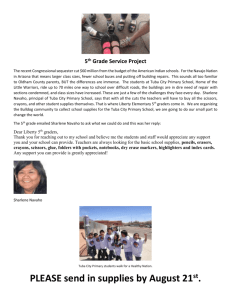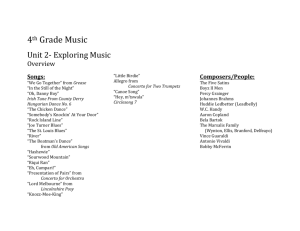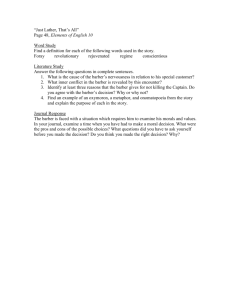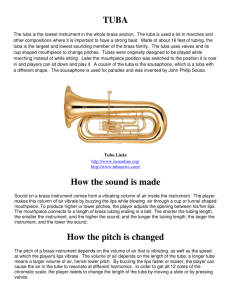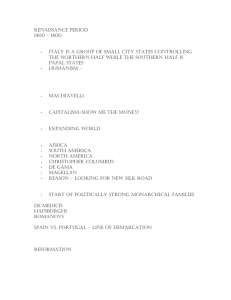,- by Senior Honors Recital
advertisement
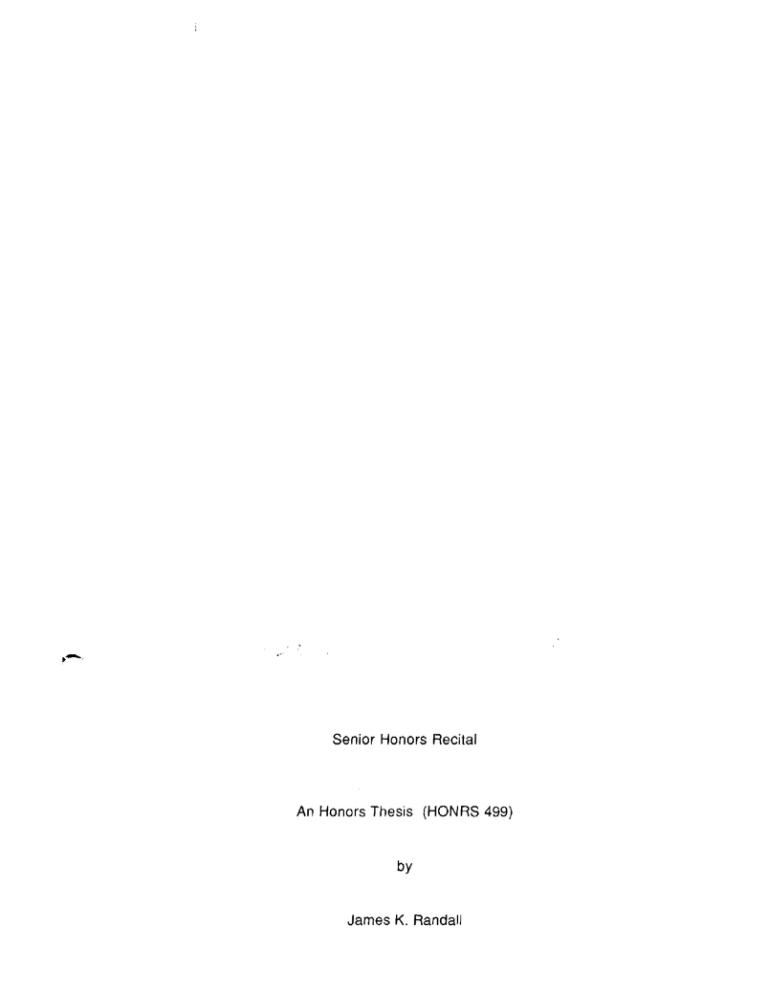
,- Senior Honors Recital An Honors Thesis (HONRS 499) by James K. Randall ,'! ~ -, Purpose of Thesis The program notes contained in this thesis provide some useful background information about the works I performed on my senior honors recital on January 19, 1992. In addition to a brief biography of each composer and composition, I have included texts to the vocal works by Samuel Barber that I transcribed for the tuba. I have also included texts to the poetry used in The Wonderland Duets. I hope that my comments are helpful to the listener seeking a deeper understanding of the works performed. - Recercada on the "Passamezzo Moderno" Die goO rt i z (1 51 0 -1 570) Diego Ortiz was a Spanish composer and theorist. His best known work, the treatise, Trattado de glasas, was the first written work on ornamentation in the music of viols. In 1553 in Rome, Ortiz published A Treatise on Dimunution from which this Recercada for bass viol was transcribed for tuba. A Recercada is simply an etude designed for technical study. A Passamezzo is a popular Italian dance in duple meter well known from the middle 16th-century to around 1650. It is lively in character and often followed by a dance in triple meter. This particular Passamezzo includes six melodic variations over the harmonic progression of the "Passamezzo Moderno." The "Passamezzo Moderno" refers to a type of Renaissance chord sequence that proceeds as follows: 1-IV-I-V-I-IV-I-(V)-1. Concerto for Bass Tuba Ralph Uaughan Williams (1872-1956) Allegro Moderato Romanza Finale-Rondo Alia Tedesca As Vaughan Williams began work on the Romanza for Harmon'lca and String Orchestra, he told the rather demanding soloist, Larry Adler, that if he, Larry, didn't approve of the first draft, he would compose a second, and perhaps a third, but if he didn't accept that one, "I'll rescore the whole thing for bass tuba!" Well, Adler settled on the first version, but Vaughan Williams must have fancied the idea of a tuba concerto too much to let it die. Vaughan Williams composed the tuba concerto at the rather advanced age of 81. In F-minor, the concerto utilizes modal devices and scoring typical of Vaughan Williams' other symphonic compositions. These characteristics combine to create the English "Folk-like" sound of many of his works. The first movement of the tuba concerto is a humorous Allegro Moderato based an English folksong entitled Filbert the Dilbert. It concludes with a demanding cadenza for tuba that exploits the higher range of the tuba. The second movement is a beautiful Romanza which also owes much to English folksong. It's use of modality serves to create a very affecting and beautiful melody. The Romanza was one of the first works to exhibit the tuba's melodic capabilities. The Finale is a sort of "Toccata" for tuba. It challenges the soloist technically as well as musically. Taken at a brisk tempo in 3/4 time, the music becomes a madcap waltz. The movement ends with another difficult cadenza with the orchestra joining the soloist for the final chord. The Tuba Concerto was first performed by Philip Catelinet with the London Symphony Orchestra on June 13th, 1954. At first greeted with mixed reviews, the .- concerto has survived these criticisms to become one of the most important works in the tuba repertoire . Three Songs, opus 45 Samuel Barber (1910-1981) Now HalJe I Fed and Eaten Up the Rose R Green lowland of Pianos o Boundless, Boundless ElJening At the age of nine, Barber left the following note to his mother: " NOTICE-- to Mother and nobody else ... I have written this to tell you my worrying secret. Now don't cry when you read it because it is neither yours or my fault. I suppose I will have to tell it now without any nonsense. To begin with, I was not meant to be an athlet [sic]. I was meant to be a composer and will be I'm sure ... Don't ask me to try to forget this unpleasant thing and go and play foot-ball. --Please--Sometimes I've been worrying about this so much that it makes me mad (not very). Love, Sam Barber II." Samuel Barber, one of America's most important composers, wasn't originally encouraged to pursue music. However, his aunt--the renowned opera singer Louise Homer--was undoubtedly influential in young Samuel's musical development as she was a frequent visitor to the Barber household. She also must have been at least partly responsible for Barber's love of vocal composition. Barber's first compositions were children's songs composed when he was 13 or 14. Barber has been described as an "elegant neo-romantic" and a "lyric poet." His music emphasizes the melodic line. When searching for song texts, he prefers lyrical Romantic poetry. The text of the song determines the form of the piece. The Three Songs, opus 45, were commissioned by the Chamber Music Society of Lincoln Center. It was in the Lincoln Center that the songs were premiered by the baritone, Dietrich Fischer-Dieskaus. The first song, 'Now have I fed and eaten up the rose', is a dark and moody selection with a quiet ending. The second, A Green Lowland of Pianos, is humorous and light-hearted in content. A reoccurring rhythmic pattern in the left hand of the piano part serves to unify the contrasting elements of the piece. The final song, 0 Boundless, Boundless Evening, is lyrical and descriptive in character. It ends beautifully with the piano fading out in the final measures. - 'Now haue I fed and eaten up the rose' Now have I fed and eaten up the rose Which then she laid within my stiffcold hand. That I should ever feed upon a rose I never had believed in live man's land. Only I wonder was it white or red The flower that in the dark my food has been Give us, and if Thou give, thy daily bread, Deliver us from evil. Lord, Amen. James Joyce From the German of Gottfried Keller - A Green Lowland of Pionos in the evening as far as the eye can see herds of black pianos up to their knees in the mire they listen to the frogs they gurgle in water with chords of rapture they are entranced by froggish, moonish spontaneity after the vacation they cause scandals in a concert hall during the artistic milking suddenly the lie down like cows looking with indifference at the white flowers of the audience at the gesticulating of the ushers Czeslaw Milosz From the Polish of Jerzy Harasymowicz - Raymond luedeke (b.1954) Wonderland Duets I. Energetically II. Grazioso III. largo IU. Moderato Originally from New York City, Luedeke began composing at the age of fifteen. He earned a performance certificate in clarinet from the Eastman School of Music, and received his doctoral degree in composition from Northwestern University. Additional studies were completed at the Vienna Academy of Music and Dartmouth College. George Crumb, George T. Jones, and Alan Stout were his major composition teachers. Luedeke has been successful in the area of performance as well as composition. He is currently the associate principal clarinet with the Toronto Symphony. Major commissions and awards granted Luedeke include the Fericy Award, a 1966 Fulbright Grant, and commisions from the Toronto Symphony as well as the Universities of Iowa, New Mexico, and New Jersey. The Wonderland Duets are scored for two tubas and narrator. The text is from the poetry of Lewis Carroll in his novel, Alice in Wonderland. The texts are as follows: Speak roughly to your little boy and beat him when he sneezes. He only does it to annoy because he knows it teases. Wow, wow, wow, I speak severely to my boy, I beat him when he sneezes For he can thoroughly enjoy the pepper when he pleases Wow, wow, wow. II "Will you walk a little faster?" said a whiting to a snail. "There's a porpoise close behind us and he's treading on my tail. See how eagerly the lobsters and the turtles all advance. They are waiting on the shingle--will you come and join this dance? Will you, won't you, will you, won't you, will you join the dance? "You can really have no notion how delightful it will be, When they take us up and throw us with the lobsters out to sea." But the snail replied 'too far, too far' and gave a look askance. Said he thanked the whiting kindly but he would not join the dance, Would not, could not, would not, could not, could not join the dance. "What matters it how far we go," his scaly friend replied. "There is another shore you know upon the other side. The further off from England, the nearer is to France. Then turn pale beloved snail, but come and join the dance. Will you won't you, will you, won't you, will you join the dance? Will you, won't you, will you, won't you, won't you join the dance?" .- - III "Tis the voice of the lobster," I heard him declare, "You have baked me too brown, I must sugar my hair." As a duck with its eyelids, so he with his nose Trims his belt and his buttons and turns out his toes. When the sands are all dry, he is gay as a lark, And will talk in contemptuous tones of the shark, But when the tide rises and sharks are around, His voice has a timid and tremulous sound. IU Twas brillig, and the slithy toves did gyre and gimble in the wabe. All mimsy were the borogoves and the mome raths outgrabe. "Beware the Jabberwock, my sonl The jaws that bite, the claws that catch. Beware the Jubjub bird and shun the frumious Bandersnatch II" He took his vorpal sword in hand: Long time the manxome foe he sought. So rested he by the Tumtum tree And stood awhile in thought, And as in ruffish thought he stood The Jabberwock, with eyes of flame, Came whiffling through the tulgey wood And burbled as it came. One two! One two! And through and through The vorpal blade went snickersnack I He left it dead, and with its head He went galumphing back. "And hast thou slain the Jabberwock? Come to my arms, my beam ish boy. o frabjous day! Callooh! Callay!" He chortled in his joy. Twas brillig. and the slithy toves Did gyre and gimble in the wabe. All mimsy were the borogoves, and the mome raths outgrabe.

